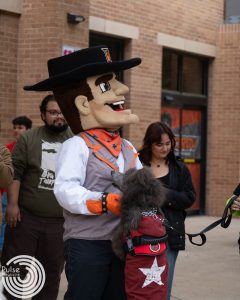Four-legged Friends: The Story of Hannah and Sisu
Meet mechanical engineering freshman Hannah Baker and Sisu, her inseparable four-legged friend and service dog.
Baker is a medically-retired veteran who sustained an injury to the lower back, from which she developed an advanced degenerative disease, during combat training at the Marine Corps. Today, Baker said she struggles with motor activity and deals with intense pains that Sisu helps mitigate.
“Since [Sisu] is a puppy with so much energy, she keeps me moving,” she said. “Before I got her, I would let myself sink into those really bad pain days.”
According to the Texas Disability Law, under the Americans with Disabilities Act, Title II and III, “a service animal must be a dog (or miniature horse) that is individually trained to do work or perform tasks for the benefit of an individual with a disability. Service animals can be professionally trained or trained by the handler themselves.”
Rebecca Monroe, access coordinator for the Student Accessibility Services said service animals are allowed to accompany their handlers everywhere they go on campus (with the exception of labs or sterile environments). On the other hand, emotional support animals are subject to accommodation in housing facilities, such as campus dormitories, under the Fair Housing Act.
She said a service animal does not have to register with SAS, although it is highly encouraged for additional accommodations. If the animal is well-behaved and trained, they are allowed to be on campus.
However, anybody on campus can ask the handler what the service animal is for and whether the animal is required because of a disability or not. If the individual’s disability is not obvious, people can also ask handlers what work or task the animals are trained to perform, Monroe said.
Baker emphasizes that not all handlers are comfortable with speaking about their disabilities and the work of their service dogs. Therefore, it is proper etiquette to ask the handlers if they are comfortable talking about their disabilities prior to inquiring. She also clarified the misconception that not all disabilities have to be visible to be real.
“I even dealt with [the misconception] in the military,” Baker said. “People would just see me and say. ‘You look perfectly fine; you don’t even look like you are in pain.’”
During her enlistment, she suffered the advanced stages of her injury and, although she would consistently seek medical assistance to report her intense physical pain, the doctors tried to convince her it was all in her head. She said it is an unfortunately very common treatment for lower ranking personnel, especially women.
“To experience that level of gaslighting is hard,” Baker said. “I started questioning [if] it [was] really in my head because the pain is telling you that it’s not but you have higher ranks telling you that it is.”
After a few years of dealing with intense pain on her own, during her second deployment, Baker’s platoon was led by a female sergeant who believed her and helped her find the care she needed. Then, she received full medical coverage for treatment and retirement.
Baker worked as an aircraft mechanic in the Marine Corps. She said she loved her job and, although she cannot perform that labor anymore, she chose to pursue a career in engineering to focus on the paperwork side of things.
Baker said her veteran benefits and Sisu’s support made it possible for her going back to school.
The two met through a Facebook post. She said that, immediately after seeing her picture, she was on the way to a small farm in the outskirts of Oklahoma to get her.
Since Sisu is still in training, learning the harder tasks, such as picking up or fetching items for Hannah, are still a working progress; however, Sisu tries her best to keep her handler’s mind off the pain.
Baker described their connection as the two being “attached at the hip.” They go everywhere together: classes, walking around campus and laying together around her house.
“She doesn’t know personal space,” she said. “If I am laying on the couch, she will be laying on top of me. Until she starts licking my face, it stops being so fun.”
Baker also said that Sisu breaks the normative stereotypes of dogs from her breed, a rottweiler. The handler said that she has experienced people walking the opposite way when they see her walking around a mall or the street with her 1-year-old big puppy.
“Sisu is so sweet,” she said. “The worst thing she could do is lick someone to death.”
On campus, Hannah and Sisu have been welcomed by students and professors. She said she has not experienced any discrimination or challenges related to her service dog. Most of the time, students do not even notice her in the classroom as she just sleeps underneath the desks.
“I get smiles across campus,” Baker said. “That brings me joy, just seeing people get happy when they see her because she is always smiling.”





